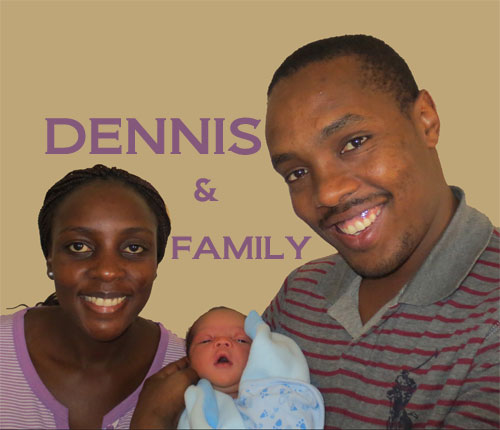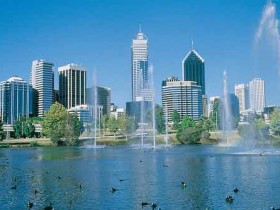
Most Kenyans in Perth know Dennis Langat. He was the mastermind of the famous Banjuka nights in Bentley. He is the Niwakati kingpin who has been relentless in bringing Kenyans in Perth together. His easy going persona and friendliness has endeared him to many. But beneath the ever smiling Deno (as he is fondly called) is a calculating, hard-working and ambitious leader.
He reveals details of his past, his present emotional state and future game-plan to Kip in an exclusive interview. It is a special interview coming so soon after he and his lovely wife Irene were blessed with a bouncing baby boy.
A New Proud Father
Kip: Congratulations. You are a brand new father.
Dennis: Yes, thank you.
Kip: What’s your son’s name?
Dennis: Netai.
Kip: What does the name mean?
Dennis: The first one.
Kip: And how is the mother?
Dennis: She is doing great. Left the hospital today, in great spirits.
Kip: How has being a father changed your perception of life?
Dennis: I have been told that I am not going to be sleeping much, and I really love my sleep! I am happy, but then not sure what to expect really. It is exciting but confusing at the same time.
Kip: More responsibilities on your shoulders?
Dennis: Definitely, more responsibilities on my shoulders. I thank God. You can never be ready to go that extra step, and it is not just with kids, with everything. There is no such thing as the right time. The right time is now. A lady once said to a friend “ I would really love to learn how to play a piano”. So the friend asked “why not?” The lady then asked “do you know how old I would be by the time I learned to play the piano?”, the friend replied: “about the same age you will be whether you learn it or not!”
Kip: Good answer!
Dennis: When you do things, don’t wait for the right time. This is the right time.
Kip: Niwakati.
Dennis: Niwakati. Exactly. This is the right time. It is always the right time.
Niwakati Entertainment
Kip: How did Niwakati Entertainment begin?
Dennis: I have been in Australia for 11 years. When I was a student in Curtin University, we started Niwakati with a friend of mine called Roy. He’s now moved to Sydney. It was a website connecting Kenyans in Perth.
Kip: Kip’s Grandfather.
Dennis: Exactly. We decided that we needed to do something for Kenyans in Australia. There were websites like Kenya254, Mashada serving the Kenyan diaspora. But there was nothing homegrown in Australia. The name Niwakati comes from, why we started it….we actually thought it was time for Kenyans in Australia to have their own website. It was that simple.
Kip: How did it move from being just a website to an events organization company?
Dennis: There was a Kenyan businessman who was bringing Tusker to Australia, he asked us if we wanted to help him, because he knew we had access to so many Kenyans, so he asked if we wanted to organize an event to promote Tusker. It turned out that as much as people were drinking Tusker, Niwakati was building a name for itself.
Banjuka Nights
Kip: What were some of the events that you organized?
Dennis: The first Kenya Night in Australia, it was actually featured in the Daily Nation Newspaper in Kenya. The biggest one was when we did Mr Africa Perth in 2007 and 2008. We did one in 2009 as well. We used to have Africa Night in a club in Bentley. The first night we did, we called it Banjuka Night and that place turned out being called Banjuka.
Kip: From DNA Banjuka song..
Dennis :Yeah, it is is actually interesting how business names sometimes come about … it is actually the people who decide on the names that you call your business or organization for that matter.
Kip: For those who never attended Banjuka Nights, how would you describe the Banjuka Nights?
Dennis: It was a Friday event for Kenyans in Perth, where we used to play Kenyan Music, actually more like African Music, because many Africans, not just Kenyans used to come for the event. It went on for a while, it was very successful. The place itself was a bit out of town, but for some reason, people were craving that type of music and that kind of environment. People were willing to travel all the way for Banjuka.
Kip: Any chance Niwakati/Banjuka making a comeback?
Dennis: As Niwakati we believe in helping Africans realize where we have come from. I am working (with others) to bring Ugandan artiste Bebe Cool to Australia. But there were issues with his visa. The event was postponed, now he will be coming in December 2012. I am actually the one sponsoring the guy. I love doing that, but I don’t have the time to be doing the running around. But who knows… it is too much work to be doing functions at the same time doing full time work, studying and running a family. I could not say that Niwakati Entertainment will come back in its former self.
I am a Pan-Africanist. I want to bring something else, called Africa Got Talent Australia, I believe if you do something, you need to stretch yourself, If you run a business and want to make a million dollars, stretch yourself by going for 10. Africa Got Talent Australia sounds like the ideal next step for me.
Kip: Any solid plans for when this would be launched?
Dennis: We are still in the planning stage. I am welcoming anyone with ideas on how to do it. It is not my idea alone on how to do it, I want it to be open, I want it to be for everyone, not just me. I want to put my input and my experience as an African and am hoping other Africans in Australia would want to promote this. It helps when we make each other feel happy and positive about things that happen in our community. It makes our people have the confidence to push themselves to achieve more. I want to keep encouraging and inspiring young Africans in Australia as this stimulates innovative thinking.
Early Days in Australia
Kip: What obstacles have you faced in Australia, and how did you overcome them?
Dennis: I came to Australia in 2001. When I first got here my folks were paying my school fees. It then got to a point where I was not getting the money that I was expecting. Life got hard, it was not easy for us. My sister passed away around 2 years after I came here, and she used to help financially. My folks had to support her kids and I had to step up, be a man and stand up for myself.
I was still young at the time, it got to a point where I needed to raise money, but being young I still wanted to have my fun. I could have been saving more money, paying my school fees but that is in hindsight, I see that I failed in that regards, but on the flipside, I also learned a lot. It is not something that I would do again in life, I wouldn’t go back to being financially careless. I was forgetting that things at home were not as easy. You have to realize, if you fail in life, never fail to learn. I learned from that. It actually made me grow.
Pan-Africanist Ideals
Kip: You mentioned that you are a Pan-Africanist. What do you mean by that?
Dennis: Before I got married, the girls who were organizing the hens night for my wife asked me where I would love to go, where would I like to take Irene one day. And I said “I want to go to Somalia” They thought it was a joke, but I actually meant it. But what I meant was that I would like to see a peaceful Africa.
I am a Pan-Africanist because we have been pushed to a corner and made to feel like we are not capable of anything. I actually know that that is not true. I know we are very capable, we can talk about several great African achievements. I am a Pan Africanist because I believe that Africans we are one people. I once questioned my lecturer for only using African children to illustrate suffering and begging. I said to him people have problems everywhere and that I would prefer if he showed people suffering in Perth because the class topic was about Australia. The lecturer apologized to me and the class.
The world has portrayed Africa as being a dark continent, with people that are incapable (which I dont believe to be true). By doing that it makes people looking at Africa from outside think negatively of Africans. It makes it hard for Africa to be treated as an equal trading partner. We may get some aid money, but lose a bigger pie in investments and trade dollars because of such perceptions.
Mastering Leadership
Kip: You are preparing for leadership. When did this journey begin? Where does this road take you?
Dennis: I am doing a Masters of Business Leadership (MBL) course. My wife did Masters of Business Administration course. She encouraged me to take on the MBL. I am very fascinated with leadership.Many people do not understand what leadership is. Some say that leadership is something you are born with while others think that you can learn it.
I think leadership is not clear cut. There is no straightforward answer about leadership. You cannot put on a leadership hat all the time. A leader can become a follower and a follower may lead at times. In Kenya we make our politicians believe they are some demigods. Leadership is about walking with each other, listening to people. When was the last time you actually sat and listened to someone. Really listened. Like you are doing right now. You are asking me a question and really listening. How many people do that? Not many.
You want to be in a situation, where you are leading, but also listening to what the people want. I am not just talking about politics. Even in organizations, managers talk to you at work but before they even come to you they have a predetermined decision of what they are going to tell you anyway, so what is the point of having the so called discussion anyway?
I have been a leader going back to uni days. Niwakati was something that required leadership. We were leaders in that regards. We were happy to do that. We were proud of that.
Kip: Got any political aspirations for Kenya or Australia?
Dennis: Not necessarily. would not say I have political aspirations as such but I get fascinated by politics. I come from a political family and that is probably why. I get fascinated … I feel sad when I see the wrong politics play out, but I would not say that I have any political aspirations.
Making a Contribution
Kip: When you see politics play out as it does in Kenya, do you get the itch to want to contribute? Want to change things?
Dennis: I do get the itch to contribute to Kenya and I think contributing to Kenya starts from even the small things that we do. The way we started the business… we provide a service to send money to Kenya through Niwakati M-pesa. The reason we started that service was to facilitate people to contribute to Kenya, to assist people back home.
As far as politics is concerned, I never want to say never, because you never know what the future holds. I do read and listen to politics here and in Kenya. Before I get into politics, if I ever get into politics, I want to do more in life, something that I can be proud of, something positive.
One of the things that I have been doing to contribute in my small town, is to put up bins in the town, and that is not costing me much. I don’t know if it is going to work, but if we don’t start somewhere, we are not going to get anywhere. We have to start with the baby steps before we achieve our big dreams.
Magnate in the Making
Kip: How about the Niwakati Money Transfer service. How is that going? What has been the market reaction for it?
Dennis: This is a money transfer business that is affordable for the sender. We deliver money directly to the recipient’s phone in Kenya. We understand the needs of Kenyans. Currently people can transfer money to our bank account, and we send the money to Kenya. It is working well, we send about $30,000 to $40,000 a month. And the positive thing is that it has created full time employment for someone in Kenya…. even though it only takes him 3 or so hours a day to process the payment.
Kip: You are committed to helping others in many ways Dennis, even through employment creation. You have an IT based venture. Tell us more about that.
Dennis: We run an IT consulting business with my friend Clement to provide computer solutions to people in Perth. It is our effort to use our IT skills to solve problems and create value, including jobs. We serve both home users and small businesses. Our website is http://www.kipit.com.au/
Kip: Where can people find out more about your Mpesa Business?
Dennis: Go to http://www.niwakati.com .
Kip: Thank you very much Dennis. Congratulations in all your ventures, and most importantly on the road ahead shaping baby Netai’s life.
Dennis: Thank you.


Great interview and congrats on Netai. I’ve known Denno for years but some of the detail is very new to me and I’m impressed – great stuff !
Great Interview.